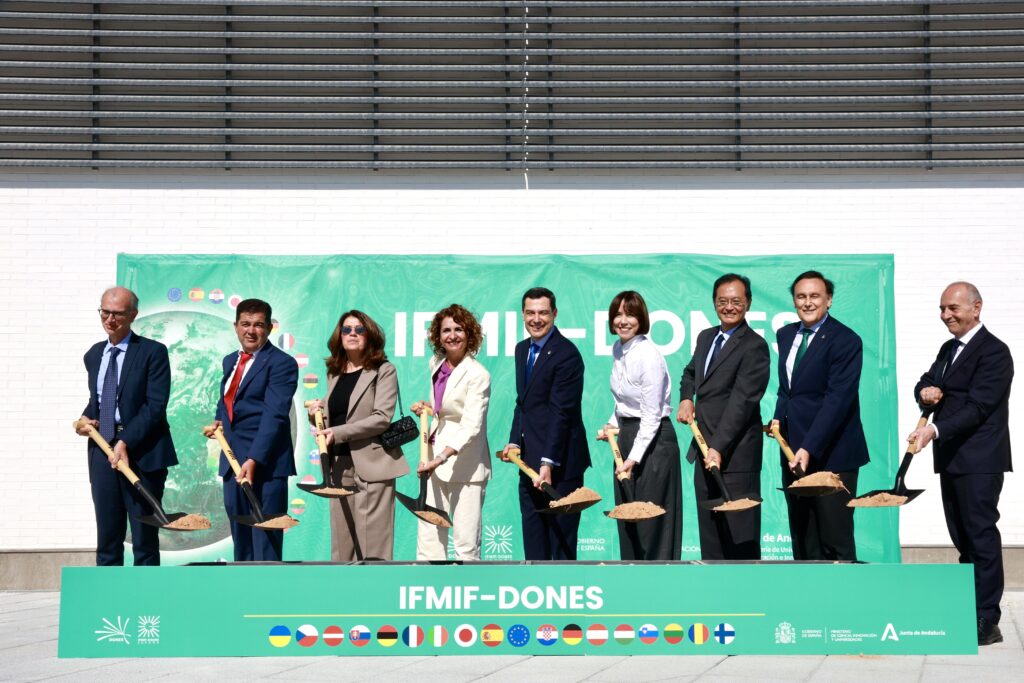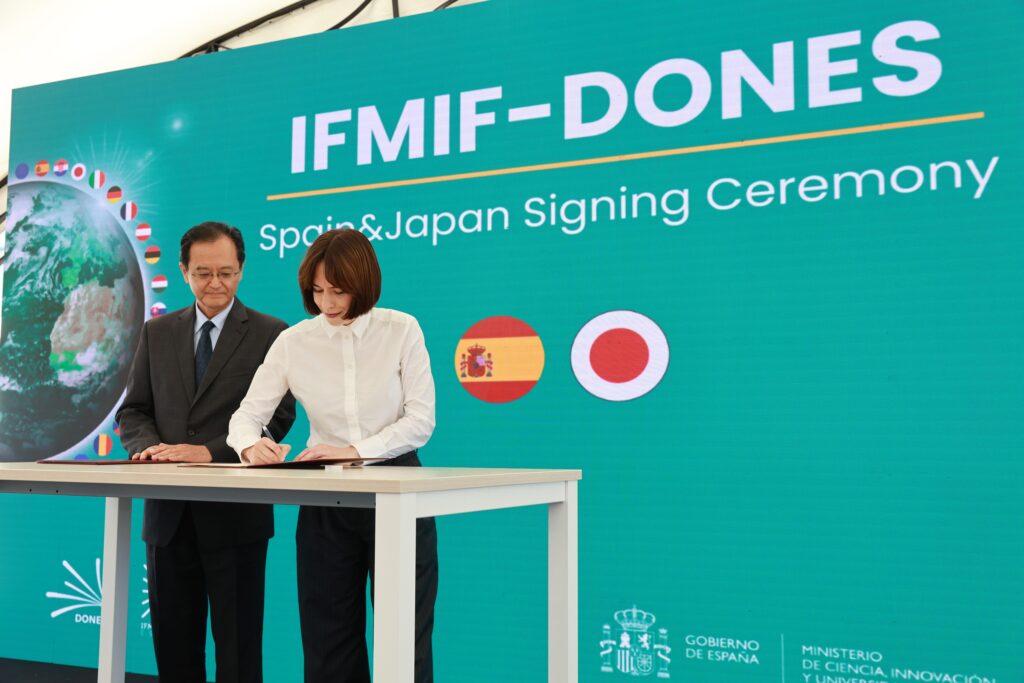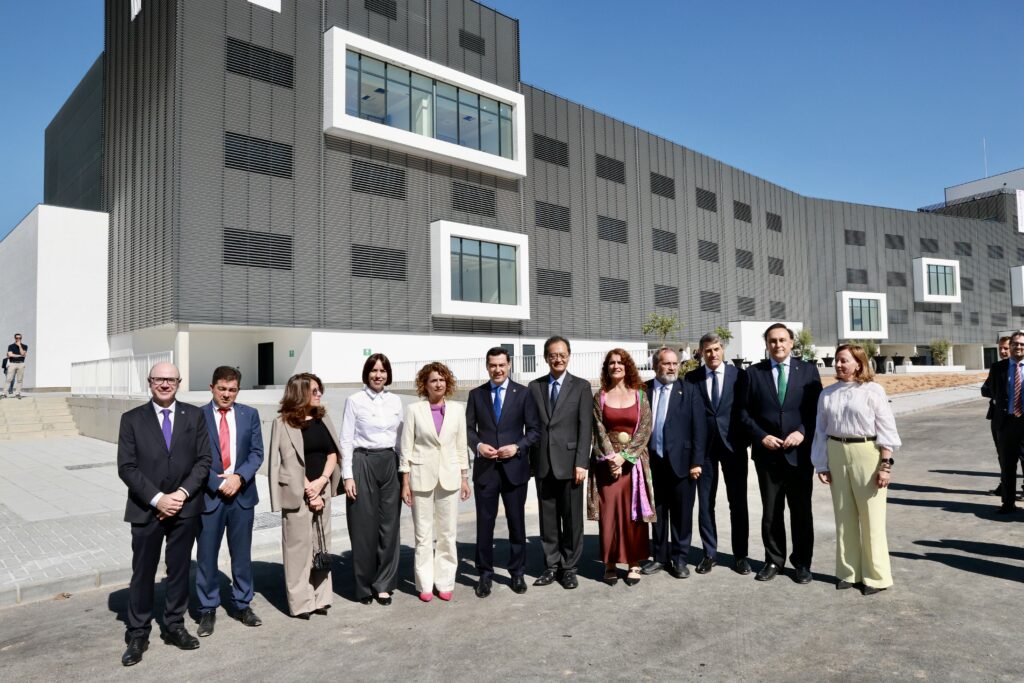IFMIF-DONES marks a historic milestone with the laying of its foundation stone and the signing of the Memorandum of Cooperation between Japan and Spain
Posted on |

The IFMIF-DONES scientific project has experienced a historic day that will remain engraved in the memory of international science and technology. On a day full of symbolism, the first stone of the IFMIF-DONES particle accelerator was laid, a unique infrastructure in the world for its type, and at the same time the signing of the Memorandum of Cooperation (MoC) between Japan and Spain was formalized, a very relevant document since it expresses Japan’s intention to contribute to the DONES Program.
The day began with the official signing of the Memorandum of Cooperation by the Minister of Science, Innovation and Universities, Diana Morant, in the presence of the Japanese Ambassador to Spain, Takahiro Nakamae. This document completes the process initiated last May 12 in Japan, when the Minister of State for Education, Culture, Sports, Science and Technology, Atsushi Nonaka, signed the agreement at the Spanish Pavilion of Expo Osaka 2025, together with the Secretary General for Research, Eva Ortega-Paíno.
Minister Morant expressed her “heartfelt” gratitude for Japan’s participation in this project during her speech. This collaboration involves 5% of the investment in the construction of the accelerator.
For his part, Ambassador Nakamae underscored the agreement’s value as an example of the solid bond between Japan and Spain, not only in scientific cooperation but also in “symbolising the strong and harmonious ties” that have united the two nations for many years.
The day began with the official signing of the Memorandum of Cooperation by the Minister of Science, Innovation and Universities, Diana Morant, in the presence of the Japanese Ambassador to Spain, Takahiro Nakamae. This document completes the process initiated last May 12 in Japan, when the Minister of State for Education, Culture, Sports, Science and Technology, Atsushi Nonaka, signed the agreement at the Spanish Pavilion of Expo Osaka 2025, together with the Secretary General for Research, Eva Ortega-Paíno.
Minister Morant expressed her “heartfelt” gratitude for Japan’s participation in this project during her speech. This collaboration involves 5% of the investment in the construction of the accelerator.
For his part, Ambassador Nakamae underscored the agreement’s value as an example of the solid bond between Japan and Spain, not only in scientific cooperation but also in “symbolising the strong and harmonious ties” that have united the two nations for many years.

The delegation then moved to the Administration Building of the IFMIF-DONES complex, which is in its final phase of construction and to which the DONES team will move later this year. This space will house the project’s technical and administrative team, providing the necessary infrastructure for the development of the construction, operation, and scientific exploitation phases that will last until 2034.
The visit to the facilities was followed by the groundbreaking ceremony, which was attended by the President of the Junta de Andalucía, Juanma Moreno; the Vice President of the Government and Minister of Finance, María Jesús Montero; the Minister of Science, Innovation and Universities, Diana Morant; the Minister of University, Research and Innovation, José Carlos Gómez Villamandos; the head of the Japanese delegation, Takashi Kiyoura; the head of the Italian delegation, Diego Bettoni; the head of the Euratom delegation, Massimo Garribba, and the Croatian Ambassador to Spain.

After the groundbreaking ceremony, the institutional representatives spoke to those attending the event.
The First Vice President of the Government, María Jesús Montero, announced that the Council of Ministers will tomorrow, Tuesday, May 20, give the green light to an investment of 174 million euros (just over 200 million euros including VAT) to tender the construction and various infrastructures associated with the accelerator’s main building.
The President of the Junta, Juanma Moreno Bonilla, announced the updating of the higher studies that the University of Granada will offer, thanks to the implementation of IFMIF-DONES, such as Data Science, AI, and Materials Engineering.
The Head of the Dones Steering Committee, Staŝa Skenžic, underlined the importance of Japan joining the project, which is evidence of its growing international support.
The head of the Japanese delegation, Takashi Kiyoura, approved the event to present the mascot of the Osaka World Exposition, Miaku Miaku, a name which, he explained, in Spanish means momentum and continuity, something that characterises IFMIF-DONES very well.
The head of the Italian delegation, Diego Bettoni, confirmed the Italian authorities’ interest in this project, which will allow the development of fusion energy through an international partnership.
The head of the Euratom delegation, Massimo Garribba, expressed the importance that the European Commission attaches to the strategy to decarbonise energy, a challenge for which fusion energy is key.
The First Vice President of the Government, María Jesús Montero, announced that the Council of Ministers will tomorrow, Tuesday, May 20, give the green light to an investment of 174 million euros (just over 200 million euros including VAT) to tender the construction and various infrastructures associated with the accelerator’s main building.
The President of the Junta, Juanma Moreno Bonilla, announced the updating of the higher studies that the University of Granada will offer, thanks to the implementation of IFMIF-DONES, such as Data Science, AI, and Materials Engineering.
The Head of the Dones Steering Committee, Staŝa Skenžic, underlined the importance of Japan joining the project, which is evidence of its growing international support.
The head of the Japanese delegation, Takashi Kiyoura, approved the event to present the mascot of the Osaka World Exposition, Miaku Miaku, a name which, he explained, in Spanish means momentum and continuity, something that characterises IFMIF-DONES very well.
The head of the Italian delegation, Diego Bettoni, confirmed the Italian authorities’ interest in this project, which will allow the development of fusion energy through an international partnership.
The head of the Euratom delegation, Massimo Garribba, expressed the importance that the European Commission attaches to the strategy to decarbonise energy, a challenge for which fusion energy is key.